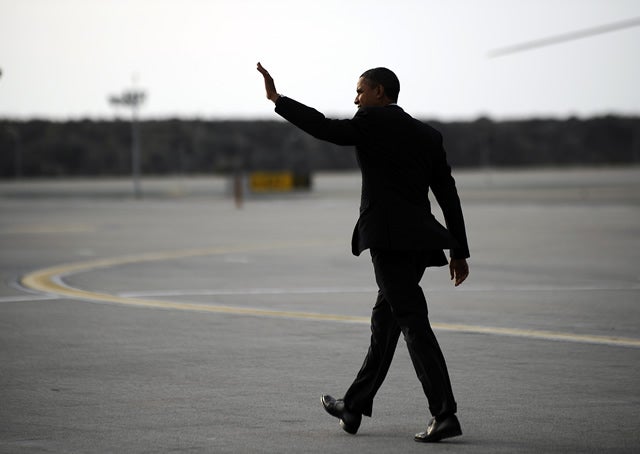Morning Bell: We Can’t Wait Either, Mr. President
Mike Brownfield /
Take a stroll through your neighborhood Occupy Wall Street protest–whether it’s in New York or Chicago, Detroit or San Francisco–and you’re likely to see a recurring theme emblazoned across cardboard signs: redistribute wealth from the 1 percent to the 99 percent, all in the name of fairness, whether or not it makes good policy. Or if you want to hear that message without fighting the crowds, you could save yourself some time, turn on the TV, and tune in to President Barack Obama’s latest campaign swing across America, this time titled “We Can’t Wait.”
“I’m here to say that we can’t wait for an increasingly dysfunctional Congress to do its job. Where they won’t act, I will,” President Obama proclaimed in Las Vegas, Nevada. “There is no excuse for the games and gridlock we’ve seen in Washington. Where we don’t have to wait for Congress, we’re just going to go ahead and act on our own.” The actions the President is proposing? More money for “underwater” mortgages and a yet-to-be-announced student loan initiative.
There is no hiding the ball in the President’s populist pitch–and that ball is Obama’s desire to circumvent Congress and enact policies that appeal to his far-left, big-government base, regardless of the will of the people or their representatives in the House and Senate. Obama’s problem is that he failed to convince the American people–and his own party–to pass his latest stimulus plan (a.k.a., “the American Jobs Act”), and now he’s headed into an election season with 14 million jobless Americans, a 9.1 percent unemployment rate, stagnant economic growth as far as the eye can see, and nothing to show for it.
Entirely frustrated by his inability to ram his big spending plan through an unwilling Congress, the President now says that “we can’t wait” for Congress to act. What he’s missing, though, is that Congress isn’t acting because the American people don’t want their representatives in Washington to go along with Obama’s spend-more-tax-more scheme. It seems that the only audience that might be receptive to the President’s message is the protesters who are camping out in solid opposition to the capitalist system, advocating for the government to bail them out, just like it bailed out the banks and the automakers. It now looks like the President is about to oblige and that the “we” he’s referring to is the protesters and him.
Yesterday in San Francisco, the city’s Board of Supervisors held a hearing in which Occupy San Francisco activists urged the board to adopt policies that would prompt big banks to modify mortgages for struggling homeowners, as Bloomberg reports. The President’s latest proposal doesn’t look much different. It would refinance mortgages of homeowners who owe more on than their houses than they are currently worth. Heritage’s David John explains that the cost of the refinanced loans will be borne by Fannie Mae and Freddie Mac, which means that American taxpayers will be on the hook for the cost. What’s worse, this plan likely won’t be any more successful than the Administration’s previous attempts to shore up the mortgage industry.
It seems that the President is about to address another concern of the “Occupy” protesters–student loans. Many of the activists are complaining about their student loans and the cost of college education and are demanding that the government pay their debts and/or provide free tuition. Though we don’t yet know what the President will propose, we do know that student loan forgiveness and federally subsidized loans are not the way to reduce the cost of education. Heritage’s Lindsey Burke explains:
It is unfair to forgive student loans on the backs of waitresses and construction workers, and the nearly three-quarters of Americans who didn’t graduate college. Increases in federal subsidies or student loan bailouts shift the burden of paying for college from the student – the person directly benefiting from college – to the millions of Americans who did not graduate from college.
Burke also points out that federal subsidies have not reduced college costs. While those subsidies have increased 475 percent, the cost of attending college has increased 439 percent since 1982. As students have more purchasing power, Burke writes, colleges are incentivized to raise tuition. “It’s a vicious cycle that does nothing to mitigate the cost of attending college,” Burke says.
But does bad policy matter to the President? Is his end game to improve America’s economic situation or to appeal to his base? Is he taking cues from Occupy Wall Street protesters as he acts unilaterally to enact tried-and-failed policies? One thing is certain: Regardless of the answer, America cannot wait for President Obama to stop circumventing Congress.
Quick Hits:
- Muammar Qadhafi was buried in a secret location on Tuesday “somewhere in the desert” in order to prevent the tomb from being desecrated or turned into a pilgrimage site.
- There are growing concerns over another U.S. credit downgrade on Wall Street stemming from worries that the congressional “super committee” will fail to reach a deal.
- Amnesty International reports that the Syrian government has “turned hospitals into instruments of repression” and that wounded patients and medical professionals have been tortured.
- A federal judge in Florida issued an order temporarily blocking a Florida law that requires welfare applicants to pass a drug test before receiving benefits. The judge said there’s a good chance the law may violate the Constitution’s prohibition against unreasonable search and seizure.
- SPECIAL EVENT: Join us today as we welcome House Speaker John Boehner (R-OH) who is speaking on reasserting American exceptionalism in the U.S.-Russia relationship. Click here to watch live at 1:30 p.m. ET.

